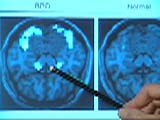
A borderline personality disorder patient's brainscan image
An Ontario woman's struggle to cope with a little talked-about mental disorder hopes the energy she's devoted to her health will help others afflicted by the silent curse.
Debra Coates was a successful businesswoman and mother who got sick in the prime of her life, some eight years ago.
"It had been a very stressful year, as you can well imagine, and one day it all caught up to me. I found myself being not being able to cope."
The only escape Coates, 48, could think of that day was suicide.
"It had never entered my mind ever before in my life," she told CTV News, recalling that first attempt to take her own life.
Over the next three or four years, there were at least eight more suicide attempts.
But instead of getting help, Coates' frequent trips to the hospital emergency room alienated her from the health care professionals.
"Once you have gone through that so many times -- going to emergency and saying 'I need help' you are not too well received... you become a thorn in their side."
All the while, Coates was being misdiagnosed. Then, after five years, she was diagnosed with borderline personality disorder.
BPD, as it's sometimes called, is more than a set of personality traits. It's an enduring pattern of behaviours that manifest in unstable moods -- from anger, shame, depression.
And, even though it's little-known, it is actually more prevalent than its higher profile counterparts including schizophrenia and bipolar disorder.
According to a doctor who specializes in the treatment of BPD at the Centre for Mental Health and Addiction in Toronto, as many as one or two in every hundred adults are affected.
"I don't think it would be too much of an exaggeration to call it a major public health problem," Dr. Robert Cardish told CTV News.
Not least, he says, because its effects are out of proportion to the number of sufferers.
"They are over-represented in hospital emergency departments, inpatient units, outpatient departments," he says, noting that they are more frequently admitted to hospital, and are prescribed more medication, than those with other mental health disorders.
Beside those practical concerns, Cardish says BPD patients must also struggling with some powerful stereotypes.
"Think of the movie Fatal Attraction where the female protagonist is portrayed as a very unstable, dangerous stalker who terrorizes this man and his family," Cardish says.
"(But) most people with BPD are not trying to kill their ex, most are struggling real hard to get along in the world and with a bit of luck and a little treatment they can do very well."
Confirming Coates' experience seeking treatment for her multiple suicide attempts, Cardish says it's not unusual for BPD traits -- from constant attention-seeking to being self-indulgent, demanding, excitable, and vain -- to make doctors reluctant to offer treatment.
"They are thought of by medical health professionals as being difficult -- too difficult. They are thought of as being ... people that you can't really help anyway."
Coates, however, persevered. Two years after her diagnosis, she had made her way from the bottom to the top of a waiting list for a course of therapy called dialectical behavior treatment.
She says the therapy turned her life around, and inspired her to try and make a difference for others suffering the same disorder.
"People are aware of schizophrenia, people are aware of depression, but people don't know about borderline personality disorder.
"I didn't know about it until I got it."
Convinced there are countless Canadians who aren't being properly treated for the disorder, Coates dedicated herself to establishing the peer support group Wisemind Inc.
And now, in her biggest project to date, she's now organizing the first Canadian conference on borderline personality disorder in early October.
Coates' group, Wisemind, has teamed up with the New York-based National Education Alliance for Borderline Personality Disorder to organize the one-day conference in Hamilton, Ontario.
Borderline personality disorder is not easy for professionals to diagnose, and self-diagnosis is not recommended. According the psychiatric guidelines of DSM IV, symptoms can include:
- A pervasive pattern of affective instability, severe difficulties in interpersonal relationships, problems with behavioral or impulse control (including suicidal behaviors), and disrupted cognitive processes.
- Frantic efforts to avoid real or imagined abandonment.
- Pattern of unstable and intense interpersonal relationships characterized by alternating between extremes of idealization and devaluation.
- Identity disturbance: markedly and persistently unstable self-image or sense of self
- Impulsivity in at least two areas that are potentially self-damaging (e.g. spending, sex, substance abuse, reckless driving, binge eating)
- Recurrent suicidal behavior, gestures or threats, or self-mutilating behavior.
- Affective instability due to a marked reactivity of mood.
- Chronic feelings of emptiness.
- Inappropriate, intense anger or difficulty controlling anger.
- Transient, stress, related paranoid ideation or severe dissociative symptoms.
Source: Diagnostic and Statistical Manual of Mental Disorders - IV
For information about Coates' conference on October 2 in Hamilton, Ontario, email the Wisemind executive director or visit the website. For more information on borderline personality disorder, contact the Centre for Mental Health and Addiction's Eleanor Liu at 416-535-8501, extension 6281. No referral is needed for information.

